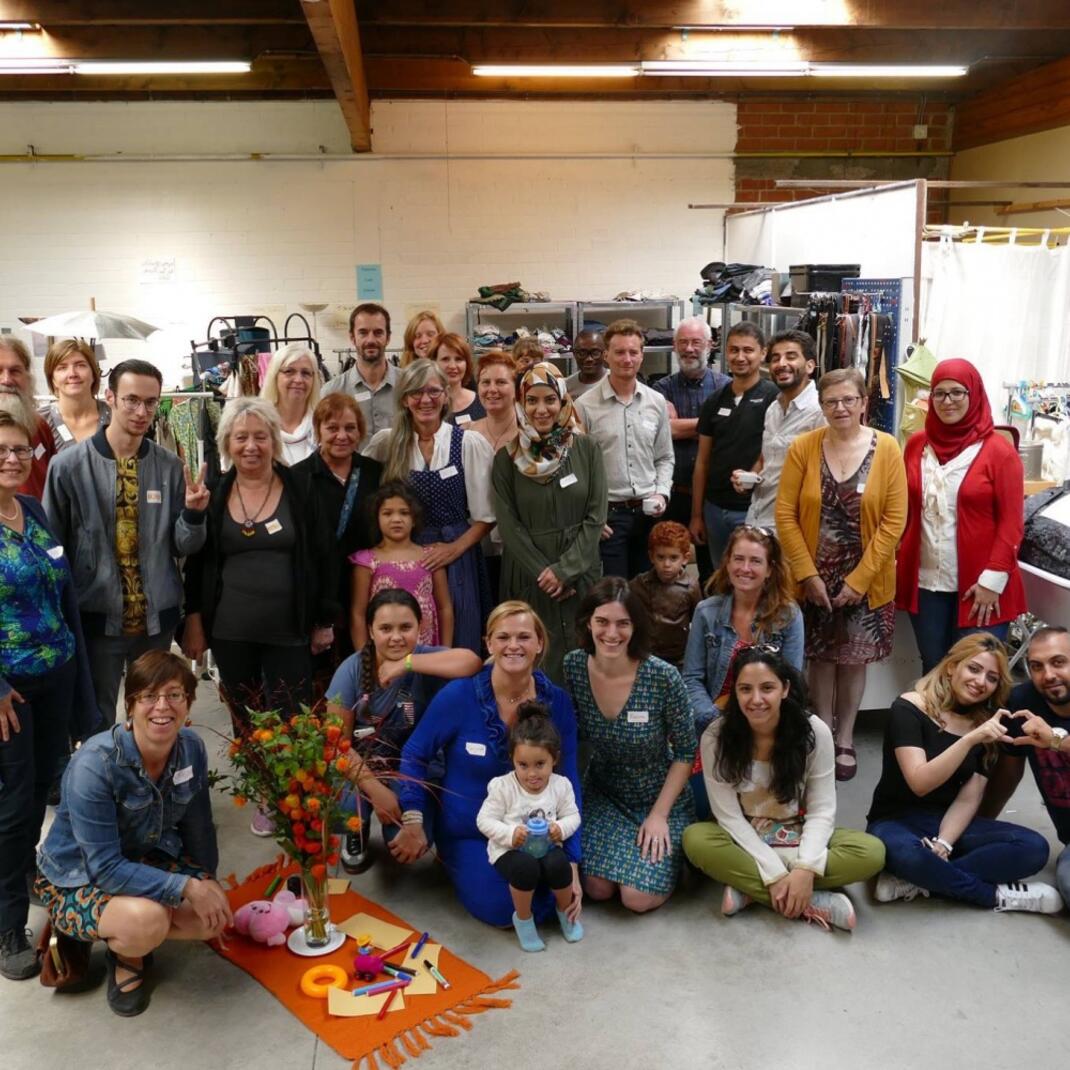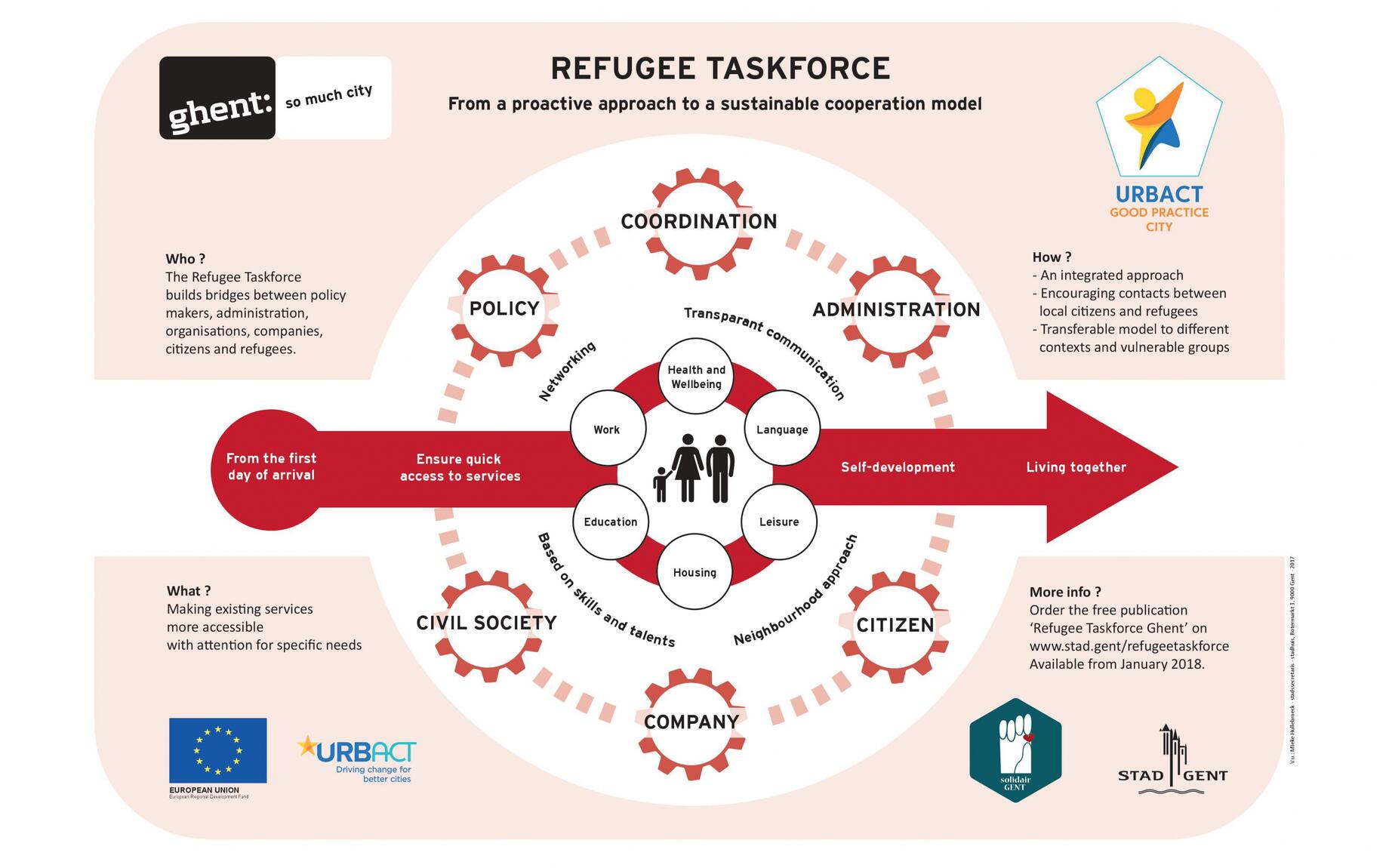Refugee Taskforce
The Refugee Taskforce is a cooperation between policy, administration, civil society and citizens to facilitate the integration process.

People are fleeing war and persecution from conflict zones like Syria, Iraq, Afghanistan, Somalia,… The city of Ghent, like other cities, is facing a growing number of refugees.
About (60%) are getting recognized as refugees. The city of Ghent believes in a pro-active approach, starting the integration process from day one. The moment asylum seekers arrive in Ghent, they are brought into contact with relevant organizations. In this way they can have a quick access to language courses, volunteer work, leisure activities… This is a two-sided approach, not only speeding up the integration process for the refugees themselves, but also allowing organizations and citizens to get to know newcomers. This is a way to address negative stereotypes and prejudices against refugees.
To coordinate all this, the city of Ghent set up the Refugee Taskforce, for which the city was awarded an URBACT Good Practice “Refugee Solidarity”. Within this structure we believe it is very important to involve everyone who can take a role in dealing with the growing number of new arrivals. This cooperation is not only between administration (city services and the Public Service for Social Welfare) and policy but also citizens, NGO’s and civil society are involved. Through this structure you can set clear roles and responsibilities. It’s not only about raising awareness about this group of newcomers, but fostering solidarity with other vulnerable groups as well.
The Ghent Refugee Taskforce in a nutshell
Read the articleDiscussed topics
The Refugee Taskforce gets together on a regular basis to discuss the following topics:
Shelter
During the peak of the crisis, the federal government asked to create extra capacity. 363 places were made available in Ghent in 2016. Now that the influx has stagnated, the federal government has closed down a number of shelters for refugees. At this moment, the City of Ghent has 85 places available for asylum-seekers of which 16 places for unaccompanied minors.
Volunteers & public awareness
The arrival of refugees brought about a huge wave of solidarity with citizens and NGO’s offering their assistance and donating materials. This resulted in setting up a give-away-shop ‘De Olijfboom’. They offer starters aid to start their new life in Ghent.
Civil Society plays a particular strong role in this, stepping up for the most vulnerable. As a local authority you can align these initiatives and offer professional guidance. For example by setting up a volunteer event and a digital platform to share info and encourage solidarity.
Housing
Once asylum-seekers have been granted international protection, they must leave the reception center within 2 months. This is a very short time to find a house within a very tight housing market. Volunteers (housing buddies) , and – in case of urgency – professionals, help them look for appropriate accommodation. For those who do not find a suitable house within the 2 months access to a transit house is offered. The city of Ghent made 10 transit houses available.
Education
The local actors responsible for education analyzed the influx of newcomers and how to adapt to it: what are the needs, are there enough places available for refugee-children. One extra reception class was established.
Several schools took initiatives concerning refugees: for example a refugees welcome kit: secondary school students, with a migration background, made a map for newcomers with places they like to hang out. They also asked the Ghent citizens to welcome the refugees by liking their initiative.
The University of Ghent also welcomes refugees as students or researchers.
Language & Civic Orientation
From the moment asylum-seekers arrive in Ghent, they can start their Dutch language courses (this is unique in Flanders). Once they are in procedure for 4 months, they can start their civic orientation program.
Health and Wellbeing
Mind Spring sessions are organized with overall aim to provide psychosocial support to asylum seekers and refugees. The Centre for Mental Health (Eclips) got extra financial support to take up extra counseling for refugees.
Work
Refugees got skills, talents and aspirations, with the ability to make contributions. Asylum-seekers are allowed to work after a waiting period of 4 months. In September 2016 an ESF project was started; the target of this project is fast-track integration into the labour market for 320 refugees, among them asylum-seekers.
Leisure time
Asylum-seekers want to make themselves useful, to practice the Dutch language, to have a network outside the refugee center. Refugees are brought into contact with all sorts of sports- and cultural activities and organizations.
As asylum-seekers are being granted international protection, they start to settle down in the different neighborhoods in Ghent. Focus has now shifted from an emergency response, to long term integration: building networks and reinforcing social cohesion as soon as they arrive in the neighborhood.
